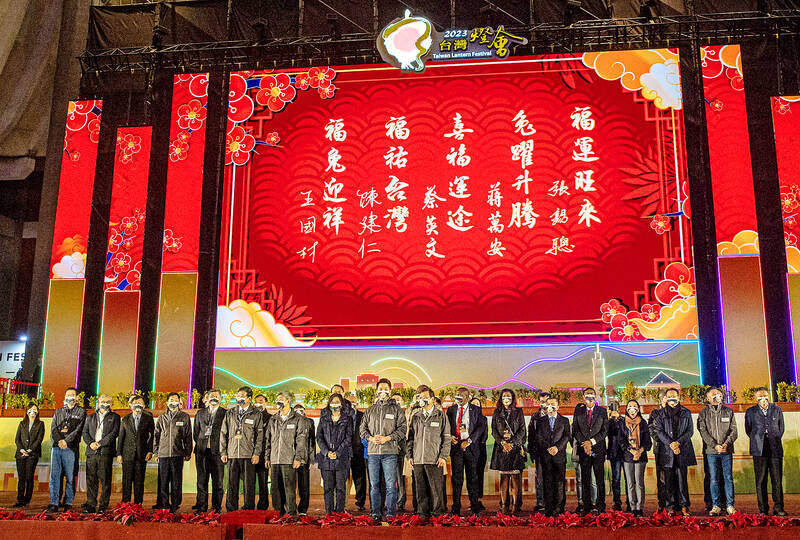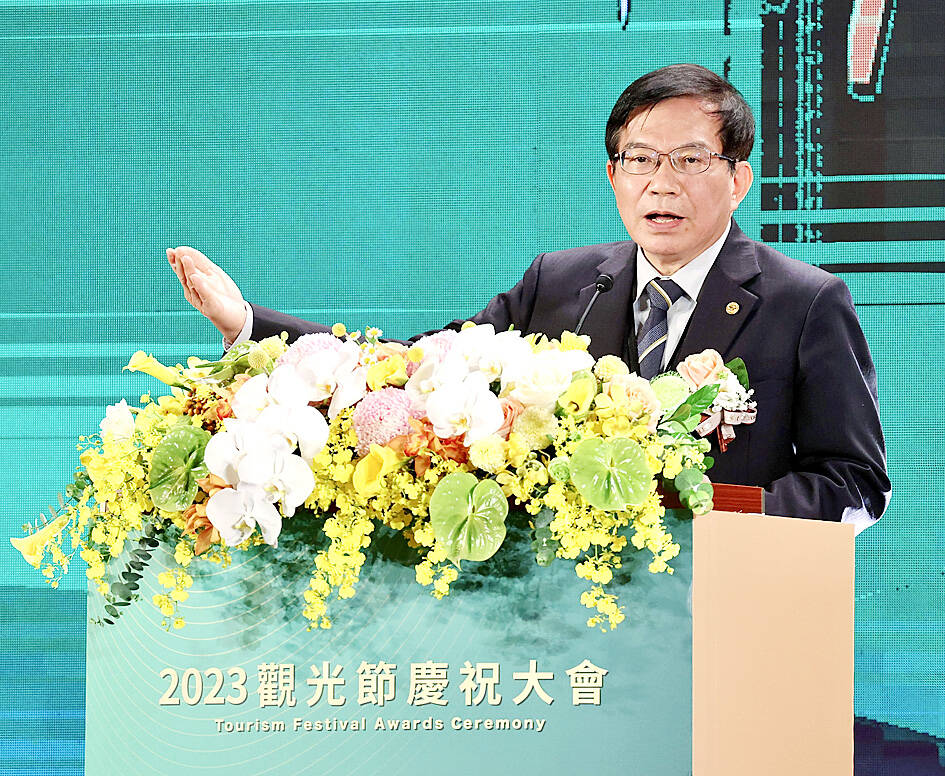The government is to spend NT$6 billion (US$200.69 million) on incentives to attract more than 6 million international tourists to Taiwan this year, including offers of free high-speed rail tickets with plane ticket purchases, Minister of Transportation and Communications Wang Kwo-tsai (王國材) said.
The budget would be funded by surplus national tax revenue from last year, according to a draft “special statute to bolster economic and social resilience and sharing economic achievement with all people in the post-pandemic era,” he said on Saturday.
The discount programs include offering free high-speed rail tickets with purchases of plane tickets to Taiwan, vouchers for tourists to exchange for fresh fruit at convenience stores, half-day tours for transit passengers and a NT$500 electronic payment card — such as an EasyCard or iPass — for independent travelers, Wang said.

Photo: CNA
As many hotels are short of hotel housekeeping staff, part of the budget would be used to subsidize the salaries of housekeeping employees, he said.
The details would be announced later, Wang said, adding that the subsidies could be offered as soon as April, as long as the special statute and the proposed budget are passed.
The special statute also includes a proposed three-year NT$20 billion budget to subsidize a monthly public transportation pass, and a NT$2.5 billion budget for improving tourist shuttle routes, and adding high-speed rail stations and key railway stations to them, as well as improving sightseeing routes suggested by local governments, he said.

Photo: Fang Pin-chao,Taipei Times
To promote the nation, more than 200 international travel agents have been invited to the Taiwan Lantern Festival, Wang said.
They are also to visit many attractions across the nation, so that they can gain an understanding of Taiwan in the post-COVID-19 era and design tour packages appropriately, he said.
The Taiwan Lantern Festival was officially launched in Taipei yesterday, and runs through Feb. 19.

Photo: CNA

Taiwanese actress Barbie Hsu (徐熙媛) has died of pneumonia at the age of 48 while on a trip to Japan, where she contracted influenza during the Lunar New Year holiday, her sister confirmed today through an agent. "Our whole family came to Japan for a trip, and my dearest and most kindhearted sister Barbie Hsu died of influenza-induced pneumonia and unfortunately left us," Hsu's sister and talk show hostess Dee Hsu (徐熙娣) said. "I was grateful to be her sister in this life and that we got to care for and spend time with each other. I will always be grateful to

REMINDER: Of the 6.78 million doses of flu vaccine Taiwan purchased for this flu season, about 200,000 are still available, an official said, following Big S’ death As news broke of the death of Taiwanese actress and singer Barbie Hsu (徐熙媛), also known as Big S (大S), from severe flu complications, the Centers for Disease Control (CDC) and doctors yesterday urged people at high risk to get vaccinated and be alert to signs of severe illness. Hsu’s family yesterday confirmed that the actress died on a family holiday in Japan due to pneumonia during the Lunar New Year holiday. CDC Deputy Director-General Tseng Shu-hui (曾淑慧) told an impromptu news conference that hospital visits for flu-like illnesses from Jan. 19 to Jan. 25 reached 162,352 — the highest

TAIWAN DEFENSE: The initiative would involve integrating various systems in a fast-paced manner through the use of common software to obstruct a Chinese invasion The first tranche of the US Navy’s “Replicator” initiative aimed at obstructing a Chinese invasion of Taiwan would be ready by August, a US Naval Institute (USNI) News report on Tuesday said. The initiative is part of a larger defense strategy for Taiwan, and would involve launching thousands of uncrewed submarines, surface vessels and aerial vehicles around Taiwan to buy the nation and its partners time to assemble a response. The plan was first made public by the Washington Post in June last year, when it cited comments by US Indo-Pacific Commander Admiral Samuel Paparo on the sidelines of the Shangri-La Dialogue

Suspected Chinese spies posing as Taiwanese tourists have been arrested for allegedly taking photographs of Philippine Coast Guard ships, local media reported. The suspected spies stayed at a resort in Palawan, where from a secluded location they used their phones to record coast guard ships entering and leaving a base, Philippine TV network GMA said on Wednesday. Palawan is near the Spratly Islands (Nansha Islands, 南沙群島) and other disputed areas of the South China Sea, where tensions have been on the rise between China and the Philippines. The suspects allegedly also used drones without permission and installed cameras on coconut trees in the